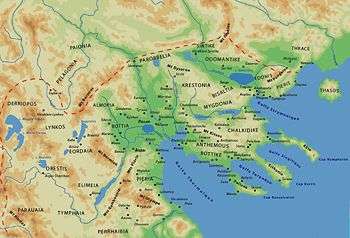Lynkestis

Lynkestis or Lynchestia (Greek: Λυγκηστίς, Λυγκηστία meaning "land of the lynx") was a region (in earlier times, a kingdom) of Upper Macedonia located on the southern borders of Illyria. The inhabitants of Lynkestis were known as Lynkestai (Λυγκησταί), a northwestern Greek tribe that belonged to the Molossian tribal state, or koinon, of Epirus.[1][2]
History
The region of Lynchestia was ruled by kings, lords and independent or semi-independent chieftains until the Argead rulers of Macedon (Amyntas IV, Philip II) neutralized Lynchestia's independence with dynastic alliances and the practice of raising tribal chieftains' sons in the palaces of Philip II. To the north of Lynchestia was the region of Deuriopus, while Paeonia was to the northeast, Pelagonia bordered on the east, Emathia and Almopia to the southeast, and Orestia, Eordaia and the Haliacmon river at some distance to the south.
The wealthy kings of Lynkestis traced their origins to the Bacchiad kings that were expelled from Corinth in the 7th century BC.[3][4][5] During the Peloponnesian War (431–404 BC) Arrhabaeus, the king of Lyncestis, waged war against Perdiccas II of Macedon (r. 451–413 BC) at the Battle of Lyncestis in 423 BC. According to Strabo, Irra was the daughter of Arrhabaeus, and that his granddaughter was Eurydice, the mother of Philip II.[6]
See also
References
Citations
- ↑ Boardman & Hammond 1982, p. 266: "On crossing the Balkan chain, we find that Hecataeus called the Orestae 'a Molossian tribe' (F 107), and Strabo (434; cf. 326) probably derived from Hecataeus his belief that the Elimeotae, Lyncestae, and Pelagones, as well as the Orestae, were Epirotic or rather Molossian tribes before their incorporation by the Macedones into the Macedonian kingdom."
- ↑ Hammond 2001, p. 158: "Pelagones in the region of Prilep, the Lyncestae in the region of Florina, the Orestae in the region of Kastoria, and the Elimeotae in the region of Kozani. These tribes were all Epirotic tribes and they talked the Greek language but with a different dialect, the Northwest Greek dialect, as we know now from the local questions which were put to the god of Dodona."
- ↑ Strabo, Geography, 7.7
- ↑ Plant 2004, p. 43: "The kings of Lyncestae, however, were Greek-speaking and claimed descent from the Bacchiadae, an important Corinthian aristocratic family."
- ↑ Fox 1973, pp. 32, 34, 36ff.
- ↑ Strabo. Geography, 7.7: "The Lyncestae were under Arrhabaeus, who was of the race of the Bacchiadae. Irra was his daughter, and his grand-daughter was Eurydice, the mother of Philip Amyntas."
Sources
- Boardman, John; Hammond, Nicholas Geoffrey Lemprière (1982). The Cambridge Ancient History - The Expansion of the Greek World, Eighth to Sixth Centuries B.C., Part 3: Volume 3 (Second Edition). Cambridge, UK: Cambridge University Press. ISBN 0-521-23447-6.
- Fox, Robin Lane (1973). Alexander the Great. London: Allen Lane.
- Hammond, Nicholas Geoffrey Lemprière (2001). Collected Studies: Further Studies on Various Topics. Amsterdam, The Netherlands: Hakkert.
- Plant, Ian Michael (2004). Women Writers of Ancient Greece and Rome: An Anthology. Norman: University of Oklahoma Press. ISBN 978-0-80-613622-6.
Further reading
- Errington, Robert Malcolm (1990). A History of Macedonia. Berkeley and Los Angeles, CA: University of California Press. ISBN 0-520-06319-8.